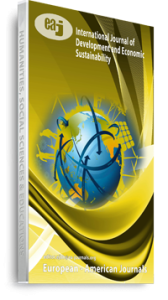This article is aimed at providing empirical evidence on the impact of human capital development on industrial growth in Nigeria. Time series data spanning 1976-2016 period on relevant variables were analyzed using both descriptive and econometric techniques. ADF procedures were used to test for stationarity of the variables. The results show that the variables moved towards equilibrium in the long-run. The results also show that recurrent expenditure on education and health has a negative impact on industrial growth. The goodness of fit was encouraging. This article asserts that rigorous pursuance of graduate skill acquisition programmes as well as adherence to the 26 per cent minimum budgetary allocation demanded by UNESCO for education which will spur improvement in human capital development will impact industrial growth positively. More-so, incentives such as tax holidays, pioneer reliefs and exemptions that aids increased investment in industrial growth be vigorously pursued by governments at all levels in Nigeria.
Keywords: Exchange Rate, Human Capital Development, Industrial Growth, Nigeria, expenditure on education, expenditure on health, gross capital formation

